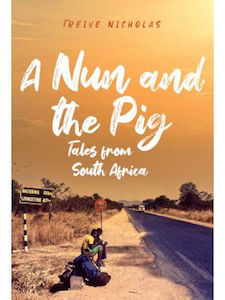Book: The Nun and the Pig

The Nun and the Pig by Treive Nicholas, publisher: Amberley Books, £18.99
If you know someone who doesn't understand why Nelson Mandela matters, this is the book for you. Many people below the age of 45 know little about Apartheid South Africa (or the Soviet Union, for that matter). This memoir, by a white British man, recalls his eight months teaching disabled children at a Catholic mission in the Transkei Bantustan in 1980. It is a digestible and enjoyable introduction to the era of white minority rule with its injustices and absurdities. If the reader is unfamiliar with Apartheid, they will soon grasp why it was the focus of so much political activity among those who lived through the era, even though we were thousands of miles away.
The Apartheid state set up Transkei as a nominally independent self-ruling administration, known as a Bantustan. It was home to 2.5 million Xhosa, an ethnic group which has produced generations of the liberation movement's leaders (Mandela, Sisulu, Biko, Mbeki, Tambo).
Bantustans theoretically had their own laws, and whites and blacks were allowed to mingle, unlike in South Africa. However, many black men left Transkei in search of mining work, meaning they were away from home for months at a time, often returning to their families only once a year. Despite their absence, Nicholas notes, it was a fiercely patriarchal society in which the nuns were called on to assert their authority regularly in order to get anything done. The author admired their determination and grace under pressure, as well as their kindness to the disabled children for whom they cared.
Nicholas was 19 when he volunteered at Ikhwezi Lokusa Special School, run by Sister Mary Paule (the nun of the title - the pig was the mission's clapped-out VW bus). He is good at capturing the atmosphere in Transkei, and of popular culture in 1980, describing the physical beauty of the place, as well as the strangeness of living in a pocket of relative liberty compared to the South African state surrounding them.
His photos are superb and evocative. He is at his best when describing the political tensions, the racist system of Apartheid and how it impacted everyday life for the vast majority of citizens whose homeland it is. Whites represented only 19% of the South African population then, yet they controlled almost every aspect of the lives of the non-white population, through so-called pass laws that required them to leave white areas at the end of each day. Blacks had to step off the pavement whenever a white approached, and were perpetually subservient, underpaid, denied proper housing, education, dignity or self-determination. Many lived their whole lives in fear that they would pay the price for infringing apartheid's many discriminatory laws.
When the author visited Durban, he got into trouble for photographing a line of black people standing in the boiling hot sun for hours, waiting for treatment at their dismal section of a hospital, a situation that would never have been endured by the white ruling class, he notes. The (white) mayor of Durban finds the young Nicholas charming and promises to introduce him to young people at the tennis club. They might have been in Surrey, he reflects. Back in Transkei, he is the only white person at a pop concert. He is amazed to encounter the self-important puppet prime minister of the Bantustan filling his car at a petrol station
He returns to Ikhwezi Lokusa Special School, aged in his late fifties, and finds a new generation of nuns running the place with kindness, efficiency (and better funding). However, Sister Mary Paule, whom he so admired, was killed at age 82 by robbers, a victim of the appalling crime wave in the new South Africa. Another of his favourite sisters died last year of Covid-19. There are few reflections on the theological motivation of the mission's founders, donors or sisters, but their decency and commitment speak for themselves.
For more information and to order a copy see: www.amberley-books.com/catalogsearch/result/?q=a+nun+and+a+pig


















